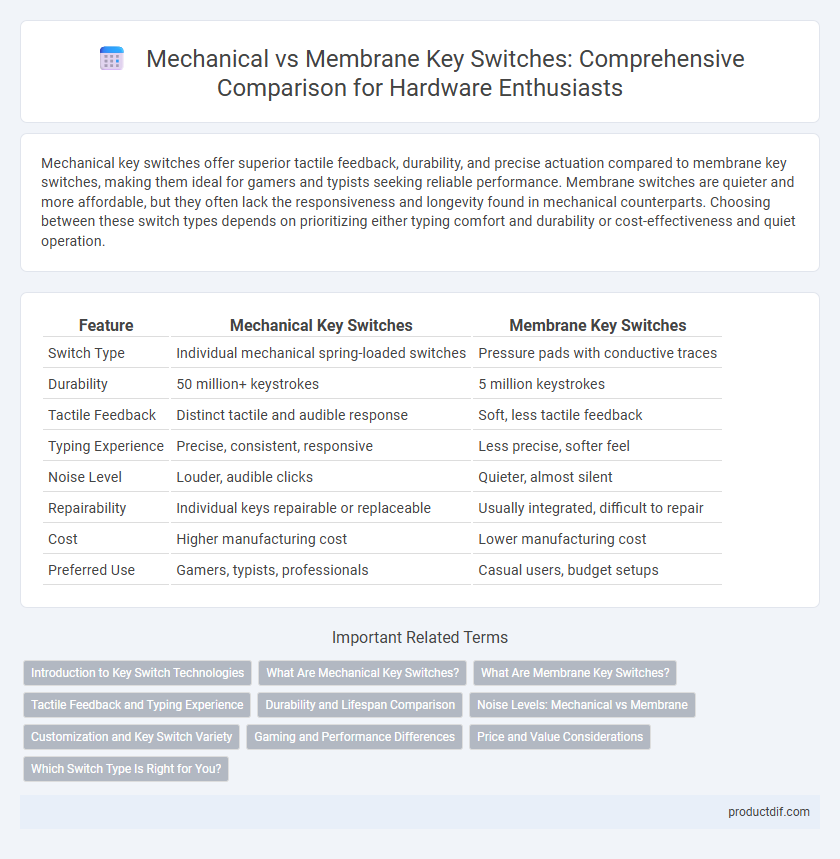Mechanical key switches offer superior tactile feedback, durability, and precise actuation compared to membrane key switches, making them ideal for gamers and typists seeking reliable performance. Membrane switches are quieter and more affordable, but they often lack the responsiveness and longevity found in mechanical counterparts. Choosing between these switch types depends on prioritizing either typing comfort and durability or cost-effectiveness and quiet operation.
Table of Comparison
| Feature | Mechanical Key Switches | Membrane Key Switches |
|---|---|---|
| Switch Type | Individual mechanical spring-loaded switches | Pressure pads with conductive traces |
| Durability | 50 million+ keystrokes | 5 million keystrokes |
| Tactile Feedback | Distinct tactile and audible response | Soft, less tactile feedback |
| Typing Experience | Precise, consistent, responsive | Less precise, softer feel |
| Noise Level | Louder, audible clicks | Quieter, almost silent |
| Repairability | Individual keys repairable or replaceable | Usually integrated, difficult to repair |
| Cost | Higher manufacturing cost | Lower manufacturing cost |
| Preferred Use | Gamers, typists, professionals | Casual users, budget setups |
Introduction to Key Switch Technologies
Mechanical key switches use individual, spring-loaded mechanisms for each key, providing tactile feedback and durability exceeding 50 million keystrokes. Membrane key switches rely on pressure pads with a conductive trace underneath, offering quieter operation but generally less responsiveness and a shorter lifespan of around 5 million presses. Key switch technology impacts typing experience, longevity, and performance, making the choice critical for keyboards tailored to gaming, typing, or office use.
What Are Mechanical Key Switches?
Mechanical key switches are individual, spring-loaded mechanisms beneath each keycap, designed for precise tactile feedback and durability, often rated for over 50 million keystrokes. These switches utilize physical components such as a stem, spring, and metal contacts to register key presses, providing consistent actuation force and audible clicks depending on the switch type. Popular in gaming and professional keyboards, mechanical switches enhance typing accuracy and responsiveness compared to membrane counterparts.
What Are Membrane Key Switches?
Membrane key switches use a thin, flexible membrane layer to register key presses, relying on pressure to complete an electrical circuit beneath the key surface. These switches are known for their quiet operation, low cost, and sleek, flat design compared to mechanical key switches. Common in budget keyboards, membrane switches offer less tactile feedback and shorter lifespan but provide a lightweight and spill-resistant typing experience.
Tactile Feedback and Typing Experience
Mechanical key switches provide distinct tactile feedback with individual spring mechanisms, enhancing typing precision and responsiveness compared to membrane key switches. Membrane switches use a pressure pad system that offers a softer, less tactile experience, often resulting in reduced typing accuracy and slower response times. Gamers and typists frequently prefer mechanical switches for their durability and superior tactile sensation, which improves overall typing comfort and speed.
Durability and Lifespan Comparison
Mechanical key switches typically offer superior durability, with a lifespan often exceeding 50 million keystrokes per switch, compared to membrane key switches which generally last around 5 to 10 million keystrokes. The individual mechanical components in mechanical switches are designed to withstand heavy use and maintain consistent performance over time. Membrane switches, relying on pressure pads and a single rubber dome, tend to degrade faster due to wear and loss of tactile feedback, resulting in a shorter functional lifespan.
Noise Levels: Mechanical vs Membrane
Mechanical key switches produce higher noise levels due to their physical stem and spring mechanism, generating distinct audible clicks or clacks with each keystroke. Membrane key switches operate more quietly, relying on pressure pads that compress a rubber dome, resulting in muted keystrokes ideal for noise-sensitive environments. Noise level comparisons typically show mechanical switches ranging from 50 to 60 decibels, whereas membrane switches often measure between 30 to 40 decibels.
Customization and Key Switch Variety
Mechanical key switches offer extensive customization options with a wide variety of switch types, such as tactile, linear, and clicky, allowing users to tailor the typing experience to their preferences. Membrane key switches typically provide limited customization, often featuring a uniform feel and fewer variant options due to their rubber dome construction. Enthusiasts and professionals seeking personalized performance frequently prefer mechanical switches for their modularity and diverse actuation forces.
Gaming and Performance Differences
Mechanical key switches provide superior tactile feedback, faster actuation, and greater durability compared to membrane key switches, making them the preferred choice for competitive gaming. Gamers benefit from precise keystroke registration and customizable actuation force, which enhances in-game responsiveness and reduces input lag. Membrane switches, while quieter and more affordable, often lack the performance consistency and longevity required for intensive gaming sessions.
Price and Value Considerations
Mechanical key switches typically have a higher initial cost compared to membrane key switches due to their durable materials and complex design. Membrane key switches offer a budget-friendly alternative but may lack the longevity and tactile feedback found in mechanical switches, impacting overall value. For users prioritizing long-term reliability and performance, mechanical switches provide better investment despite the premium price.
Which Switch Type Is Right for You?
Mechanical key switches offer precise tactile feedback and greater durability, often rated for over 50 million keystrokes, making them ideal for gamers and professionals who require reliability and responsiveness. Membrane key switches, with quieter operation and lower manufacturing costs, suit casual users or office environments prioritizing affordability and noise reduction. Choosing the right switch depends on your typing experience preference, budget, and the specific use case, such as gaming, typing, or everyday computer use.
Mechanical Key Switches vs Membrane Key Switches Infographic

 productdif.com
productdif.com